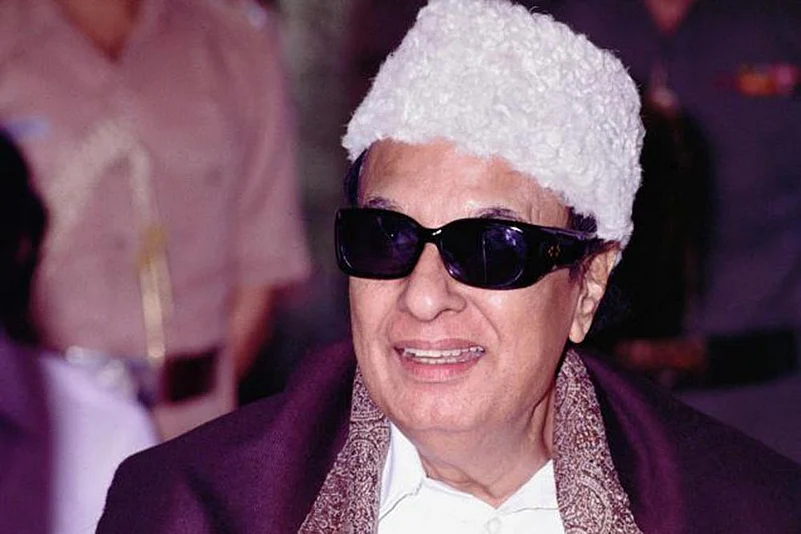It is an irony that the party MGR founded is being racked by splits and crises on his hundredth birth anniversary. While his followers are not doing their leader proud, R. Kannan has more than compensated by his incisive biography of India’s first film hero-turned-chief minister.
MGR—A Life is the most exhaustive account of this Malayali born in Kandy, Sri Lanka, who went on to capture the hearts of Tamils first through cinema and then through politics. The book unwraps the enigma that MGR was—INScrutable to most, his true self further concealed by his fur cap and dark glasses.
The first half dwells on MGR’s struggle to make a mark in Tamil theatre, his move to cinema and how he established himself as a force along with Sivaji Ganesan—the duo’s film rivalry extending to their politics as well. But it was MGR who came out on top in politics. On the other hand, Sivaji was loved for his acting, but not on the political stage.
“MGR had decided early on to succeed in a big way in politics. Therefore, he played roles that would bring him respect from people. That is why MGR succeeded in politics. I acted as a drunk, womaniser, murderer and rowdy many times. I realised only later that people did not wish to see me as a politician. They had wished to see me only as an actor. So many actors have come to politics. Have all of them become leaders?” Sivaji asked during a 1997 interview.
The book reveals how MGR had used the DMK machinery, his proximity to DMK founder Annadurai and his friendship with Karunanidhi to position himself as the centrepiece of DMK politics. Later, when the DMK split and MGR formed the AIADMK, his charisma and people-oriented welfare schemes like noon meal for children and the destitute ensured that his friend-turned-rival Karunanidhi remained in the opposition as long as MGR was alive. One reason for that, says Kannan, is that MGR did not depend on caste, religion or language for votes. “His image, charisma and political appeal transcended such electoral considerations. He proved to be an astute and consummate politician, except for his occasional gaffes,” Kannan writes.
After one such gaffe, when under pressure from PM Morarji Desai he had backed out from supporting Indira Gandhi when she wanted to contest a Lok Sabha byelection from Tamil Nadu, MGR bent backwards to make up with her once she returned to power in 1980. After his (unjustified) dismissal midway through his first term, MGR was careful to be on the right side of those who ruled in New Delhi. Kannan offers great INSight on how MGR had to balance between an assertive and uncooperative Centre and the regional pulls (especially on the Lankan Tamil issue), compounded by the shrill parochialism of Karunanidhi. “MGR’s approach was to befriend prime ministers and those in power at the Centre. He desired no confrontation with an omnipotent Centre,” explains Kannan.
He also rightly blames “the competitive politics, bad blood and bitter acrimony” between MGR and Karunannidhi for the constant one-upmanship between them, which ultimately laid the foundation for the intractable hostility between Karunanidhi and Jayalalitha. Jayalalitha scaled up the bitterness and rivalry to such an extent that her party MLAs even refrained from greeting their counterparts in the DMK during assembly sessions.
The book details the ups and downs in the relations between MGR and Jayalalitha, on how her own ego and desire to call the shots swiftly overcame her gratitude to her mentor, who identified her (though indirectly) as his political heir. Kannan also exposes how MGR’s government, in spite of its welfare measures, soon became captive to liquor barons and how his final term, when he could not speak after his illness, was marked by a free-for-all by his ministers and his wife V.N. Janaki, who briefly succeeded him after his death.
Kannan’s biography is direct, and he chooses to be judgmental only while concluding the narration. And he is unsparing about MGR’s governance: “A highly private man, his administration was opaque. How a man wedded to prohibition could go to the other extreme, where he midwifed liquor barons, who in turn bankrolled his party and his private acts of largesse, defies comprehension.”
But Kannan admits that MGR was a rare political phenomenon, someone who would be emulated later by the likes of N.T. Rama Rao. “Few could read the masses like MGR did. Not surprisingly, none before or after has been deified like MGR,” Kannan says. True, while MGR was worshipped, Jayalalitha was feared.


























